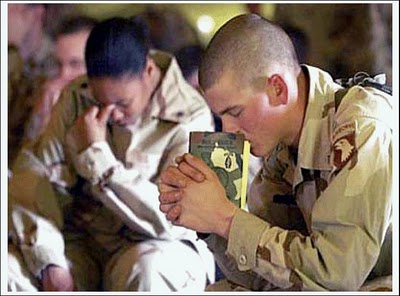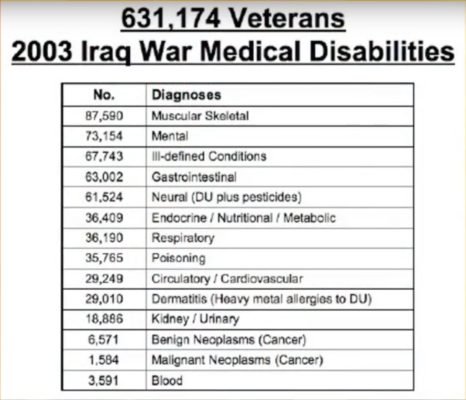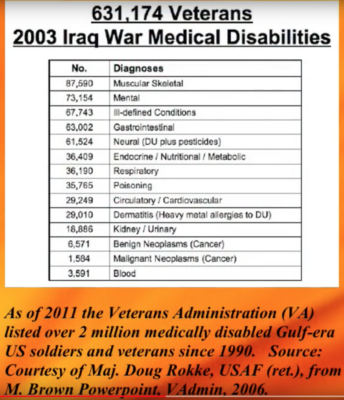
If it is the intention to ensure those who serve their country cannot come home and serve it again, the following information appears to show a clear strategy in this regard.
If ever proof was required that war is all about population cull, and to arm more and more of the populations, while filling yet more the coffers of the banking families and not some heroic adventure for queen or country, a glimpse into what is injected into our soldiers as far back as the First World War as they embark on a journey which will effect them for the rest of their days, is in order.
Since the introduction of Depleted Uranium into the arsenal of our military’s, what has been called ‘Gulf War Syndrome,’ better called ‘War Syndrome,’ has risen in parallel. If the bombs and bullets do not get them, then they will be vaccinated with some heinous chemical cocktail to disable them physically for the rest of their lives. Not only that, the pharmaceutical companies make yet more money in selling the medication these poor young men will ingest again for they’re remaining years. The following report will help one better understand why our troops come back from the theatre of war with more than nightmare memories, soul loss and the constant thoughts….Did it have any worth whatever.
Source
52 percent of soldiers severely injured in Iraq and Afghanistan who have come to the US Army’s largest hospital for treatment have been diagnosed with traumatic brain injuries (TBI), internal studies have found.
The results of the study, carried out by Defense and Veterans Brain Injury Center (DVBIC) at Walter Reed Army Medical Center, also showed a steep increase, from 33 percent in TBI cases since the end of 2008.
Improvised explosive device (IED) attacks are said to be the main cause of TBI
According to DVBIC at Walter Reed, since January 2003 — just before the beginning of the Iraq War, 52 percent of soldiers wounded in Iraq and Afghanistan specifically by explosives, and treated at the hospital have been diagnosed with TBI. According to figures found by the Mainichi, this means the number of diagnosed TBI cases has risen to well over 10,000 since the end of 2008, when the figure stood around 9,100. It was also found that in more than 90 percent of those diagnosed with TBI, the patient had no visible head injuries.
TBI is caused by the supersonic shockwave produced by an explosion, often from an IED which damages or destroys brain cells, soldiers caught in the blast may not even know they have received an injury.
The US Department of Defense began conducting cognitive ability tests on all military personnel to be deployed to Iraq or Afghanistan in November 2007. The servicemen and women who undertook the tests began returning from their combat tours early this year, allowing for greater chances of discovering a TBI and probably leading to the increased numbers of diagnosed cases.
In a study carried out by Journal of Head Trauma Rehabilitation, January/February 2009 – Volume 24 – Issue 1 – p 14-23, doi: 10.1097/HTR.0b013e31819581d8, it was found that :
A total of 22.8% of soldiers in a BCT returning from Iraq had clinician-confirmed TBI. Those with TBI were significantly more likely to recall somatic and/or neuropsychiatric symptoms immediately post injury and endorse symptoms at follow-up than were soldiers without a history of deployment-related TBI.
A total of 33.4% of soldiers with TBI reported 3 or more symptoms immediately post injury compared with 7.5% at post deployment.
For soldiers injured without TBI, rates of 3 or more symptoms post injury and post deployment were 2.9% and 2.3%, respectively. In those with TBI, headache and dizziness were most frequently reported post injury, with irritability and memory problems persisting and presenting over time.
They concluded the following :
Following deployment to Iraq, a clinician-confirmed TBI history was identified in 22.8% of soldiers from a BCT. Those with TBI were significantly more likely to report post injury and post deployment somatic and/or neuropsychiatric symptoms than those without this injury history. Overall, symptom endorsement decreased over time.
In a study carried out by Brett J. Theeler MD, and Jay C. Erickson MD, PhD, it was found that In total, 33 of 81 (41%) soldiers evaluated for headaches reported a history of head or neck trauma while deployed to Iraq. A total of 18 (22%) subjects had concussion without loss of consciousness and 15 (19%) had concussion with loss of consciousness. Ten subjects also had an accompanying traumatic neck injury. No subjects had moderate or severe traumatic brain injury. Exposure to blasts was the most common cause of trauma, accounting for 67% of head and neck injuries. Headaches began within one week after trauma in 12 of 33 (36%) soldiers with head or neck injury. Another 12 (36%) reported worsening of pre-existing headaches after trauma. Headaches were classified as migraine type in 78% of soldiers with head or neck trauma. Headache types, frequency, severity, duration, and disability were similar for soldiers with and without a history of head or neck trauma.
They concluded :
A history of mild head trauma, usually caused by exposure to blasts, is found in almost half of returning US combat troops who receive specialised care for headaches. In many cases, head trauma was temporally associated with either the onset of headaches or the worsening of pre-existing headaches, implicating trauma as a precipitating or exacerbating factor, respectively. Headaches in head trauma-exposed soldiers are usually migraine type and are similar to non traumatic headaches encountered at a military specialty clinic.
Sources
Journal of Head Trauma Rehabilitation : http://journals.lww.com/headtraumarehab/Abstract/2009/01000/Traumatic_Brain_Injury_Screening__Preliminary.3.aspx
Mild Head Trauma and Chronic Headaches in Returning US Soldiers : http://onlinelibrary.wiley.com/doi/10.1111/j.1526-4610.2009.01345.x/full
Further Study
Diagnosing TBI and PTSD in Returning Soldiers : http://www.clinicalpsychiatrynews.com/single-view/diagnosing-tbi-and-ptsd-in-returning-soldiers/0e6f1508e0.html

